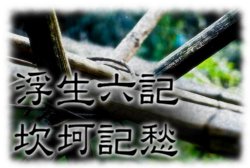Six Records of a Floating Life, 3: Kanke Jichou (Section 15)
 This is a sentence-by-sentence translation from the chapter 坎坷記愁 in Shen Fu’s 浮生六記 (Six Records of a Floating Life). It aims to be literal and close to the original text as far as possible, rather than be an idiomatic conversion to English.
This is a sentence-by-sentence translation from the chapter 坎坷記愁 in Shen Fu’s 浮生六記 (Six Records of a Floating Life). It aims to be literal and close to the original text as far as possible, rather than be an idiomatic conversion to English.
(See the index of 浮生六記 translations)
浮生六記 → 第三卷:坎坷記愁 → Section 15
及醒,東方已白,短牆外忽有步語聲,急出 探視,蓋土人趕集經此也。 By the time I awoke, it was already light in the east and outside the low wall I suddenly heard the sound of footsteps and speech; I rushed out to see, and saw that it was some people on their way to the market passing by here.
蓋 here marks an explanation of the previous statement. [趕集](http://www.zdic.net/cd/ci/10/ZdicE8ZdicB5ZdicB6340212.htm) is a binome meaning 'to go to market'.
問以途,曰: I asked as to the way, and one said:
「南行十里即泰興縣城,穿 城向東南,十里一土墩,過八墩即靖江,皆康莊也。」 “To the south go ten _li _and that’s Taixing, the county seat; pass through the town to the south-east and after ten _li _there’s an earthen mound; pass eight mounds and that is Jingjiang; this is all on major roads.”
_即 is similar to 就是 in modern Mandarin - 'that is'. [泰興](http://en.wikipedia.org/wiki/Taixing "Taixing - Wikipedia") is a city in Taizhou. [縣城](http://www.zdic.net/cd/ci/7/ZdicE5Zdic8EZdicBF207420.htm) is a binome meaning 'county seat'. [康莊](http://www.zdic.net/cd/ci/11/ZdicE5ZdicBAZdicB776317.htm) is a binome meaning something like 'landmark' or 'major route'._余乃反身,移 爐於原位,叩首作謝而行。 I thereupon turned around, moved the incense pot to its original position, kowtowed as thanks and left.
過泰興,即有小車可附。 After I passed Taixing, there were then small carriages that one could take.
_附 is 'attach', so this is something like 'attach to one's entourage'. 'Take' is a more sensible translation, though._申刻抵靖。 At a quarter past four, I arrived at Jingjiang.
_靖 here is an abbreviation of 靖江._投刺 焉。 I left my calling card about this.
_投刺 is a binome with a meaning like the modern 名片 - a name card._良久,司閽者曰: After a long time, the gate-keeper said:
司閽 is nominalised by 者 - it seems a little excessive as 閽 can be translated as ‘gate keeper’ on its own. The three characters could be pedantically translated as ‘the man in charge of controlling the gate’.
「范爺因公往常州去矣。」 “Mr Fan, because of business, has gone to Changzhou.”
_The structure of 往常州去 is literally 'has to Changzhou gone'. [常州](http://en.wikipedia.org/wiki/Changzhou "Changzhou - Wikipedia") is a city in Jiangsu._察其辭色,似有推 托,余詰之曰: On observing his refined language and appearance, it seemed he was giving an excuse, and I investigated it, saying:
「何日可歸?」 When might he return?
曰:「不知也。」 He said: “I don’t know.”
余曰:「雖一年亦 將待之。」 I said: “Even if it’s a year, I’ll wait for him.”
閽者會余意,私問曰: The gate keeper understood my intention, and discretely asked me:
「公與范爺嫡郎舅耶?」 “Are you Mr Fan’s brother in law?”
This line is a confusing mix of Chinese family terms. The gloss is: [you] [and] [Mr Fan][] [first wife] [you] [maternal uncle] [(question)] According to Pratt and Chiang this equates to a brother in law.
余曰:「 苟非嫡者,不待其歸矣。」 I said: “If I were not his brother in law, I would not await his return.”
閽者曰:「公姑待之。」 The gate-keeper said: “Then you wait a while for him.”
_[姑](http://www.zdic.net/zd/zi/ZdicE5ZdicA7Zdic91.htm) here means 暂且 - 'temporarily'._越三日,乃以回 靖告,共挪二十五金。 After three days, I was thereupon informed that he had returned to Jingjiang, and in total given twenty-five golds.
_This 以 structure is a bit like the modern 把: 'taking [his] return to Jingjiang informed' -> 'informed of [his] return to Jingjiang'. 挪二十五金 could be translated as 'twenty five golds were moved to me'._雇騾急返,芸正形容慘變,咻咻涕泣。 I hired a mule and hurriedly returned; Yun at that moment looked as if there had been a tragic event, crying out and weeping.
見余歸,卒然曰:「君知昨午 阿雙捲逃乎? Seeing me return, she abruptly said: “Did you know that yesterday noon Ah Shuang bundled up our valuables and ran away?”
_捲逃 is a binome, literally 'bundle flee'. It means to gather up one's possessions (or in this case someone else's) and leave in a hurry._倩人大索,今猶不得。 I asked people to make a big search, but at present we still haven’t got him.
_倩 here is likely 請._失物小事,人係伊母臨行再三交托,今若逃歸,中有大江之阻。 Losing our things is a small matter, but what about our relationship with his mother, who upon our departure repeatedly put her trust in us? Now it seems that he has fled and returned, but in between is the obstacle of a large river.
_伊 here has the function of 其 ('his'). 臨行 binome. 交托 binome._已覺堪虞,倘其父母匿子圖詐,將奈 之何? 且有何顏見我盟姊?」 I already feel this is cause for concern; what if his parents have hidden the child in a plan to blackmail us, then what can we do about it? Moreover, how can I face my sworn sister?
余曰:「請勿急,卿慮過深矣。 I said: “Please do not worry; you’re thinking it over too deeply.
匿子圖 詐,詐其富有也,我夫婦兩肩擔一口耳, Hiding the child in a plan to blackmail us - blackmail is for those who have money; we two can shoulder the burden of one mouth and that’s all;
況攜來半載,授衣分食,從未稍加撲責,鄰里咸知。 Moreover, we’ve supported him for the past half a year, given him clothes and shared our food, and never have we even slightly struck or reproached him; the neighbours in the village all know this.
此實小奴喪良,乘危竊逃。 Here the truth is that the little slave has lost his goodness, and taken advantage of our bad situation by stealing and fleeing.
Useful links
- The full Chinese text of 浮生六記 (from Project Gutenberg)
- Six Records of a Floating Life (Penguin Classics) on Amazon (a much more idiomatic translation)
